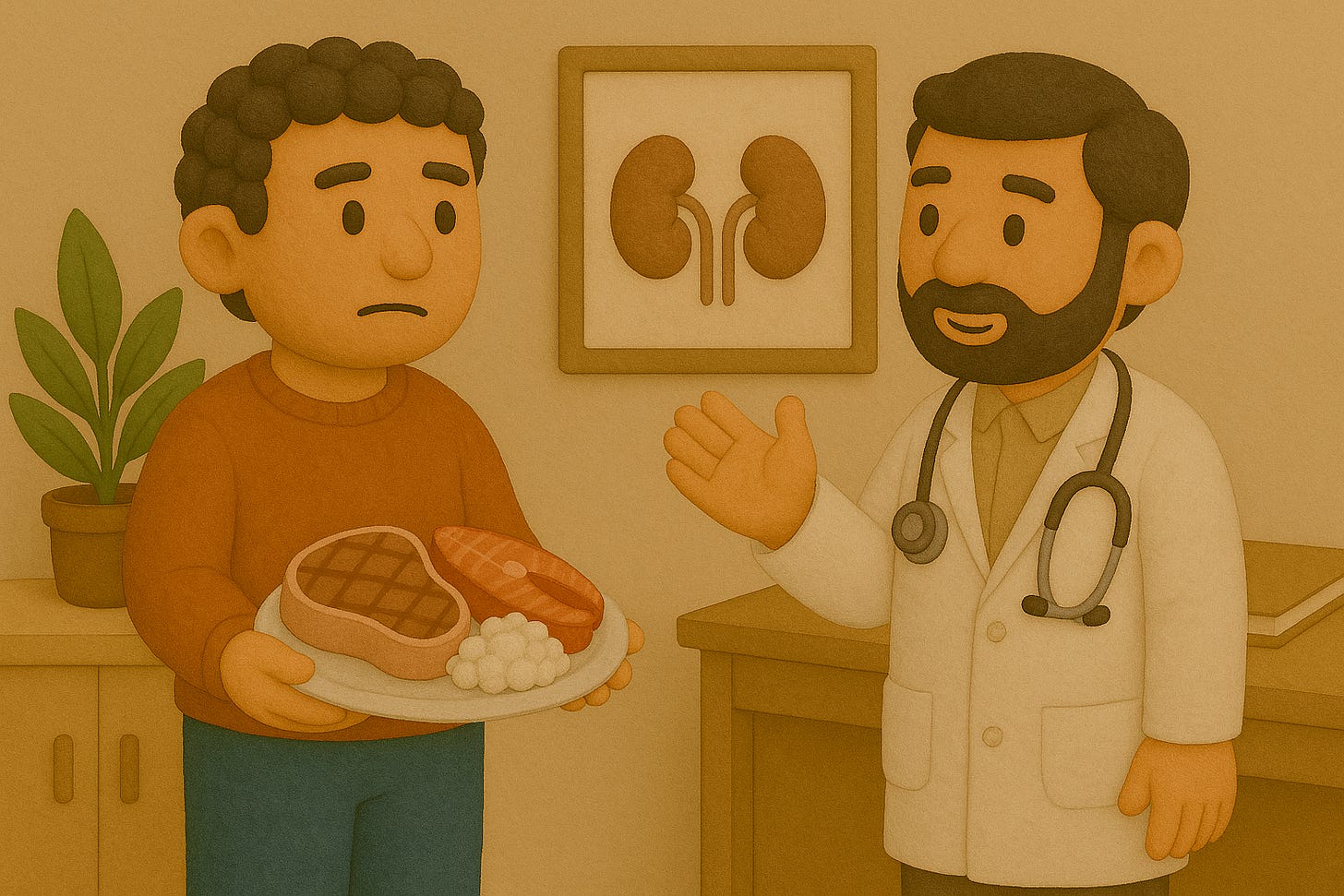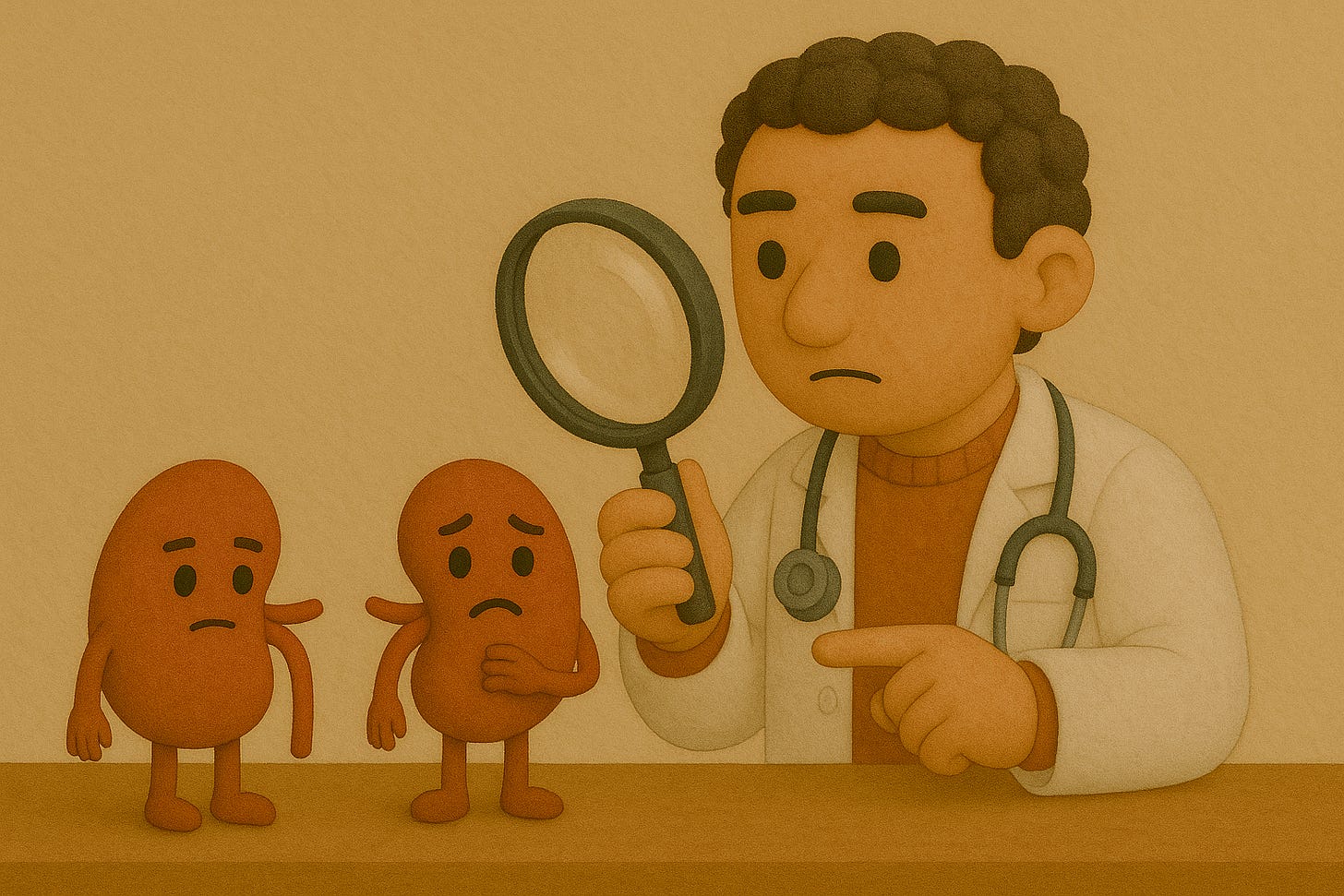Debunking Myths: The Truth About Protein and Kidney Health
Protein Isn’t the Problem. Misinterpretation Is.
You’ve probably heard it before: “Eating too much protein is bad for your kidneys.”
It’s repeated so often that most people take it as fact. Trainers, doctors, even family members repeat it like gospel. But here’s the truth: unless you already have kidney disease, high protein diets are not inherently harmful.
And yet, misinformation leads countless people to cut back on protein, missing out on one of the most powerful nutrients for strength, fat loss, and longevity.
This is a subject that’s close to my heart because I’ve experienced firsthand how misinformation can lead to unnecessary fear and confusion.
So today, let’s unpack this myth. I’ll share my own story, the science behind kidney markers, and why you probably don’t need to fear protein at all.
Before we get started, let me make one thing clear: I’m not a doctor or a medical professional. Always consult your healthcare provider and do your own research. What I’m sharing here is based on my personal experience and the knowledge I’ve gathered over the years.
High protein diets are not the enemy—misinterpretation of lab results is.
Here are the key lessons I learned going through this myself:
Why elevated creatinine doesn’t always mean kidney damage
The role of lifestyle, muscle mass, and supplements in test results
What markers give a clearer picture of kidney health
How to approach protein intake with confidence
My Personal Experience
I donate blood two to three times a year, and each time, I undergo a basic health checkup, including a blood test.
During my last donation, the doctor informed me that my creatinine levels were quite high. Creatinine is a marker often used to assess kidney function.
In people with kidney failure, creatinine levels are typically elevated. Naturally, this news was concerning.
The doctor, however, didn’t delve deeper into the matter. Instead, she asked if I worked out and consumed a lot of protein. When I confirmed both, she seemed almost upset, warning me that my lifestyle choices were detrimental to my health.
She suggested that my high protein intake and intense workout regimen were putting my kidneys at risk.
Understanding Creatinine Levels
At the time, I was already somewhat educated on the topic, but her words still rattled me.
I decided to investigate further. Creatinine is indeed a marker for kidney function, but it’s not without its flaws. Creatinine levels can be elevated in individuals who:
Work out regularly: Physical activity increases muscle mass, which in turn can raise creatinine levels.
Supplement with creatine: Creatine is a popular supplement among athletes, and it can elevate creatinine levels slightly.
Consume a high-protein diet: While protein itself doesn’t directly turn into creatinine, the increased muscle mass and turnover that often come with higher protein intake can raise levels.
Have above-average muscle mass: More muscle means more creatinine production.
In other words, the very things that make you healthier can push creatinine higher—without any real kidney damage.
All four of these factors applied to me, but that didn’t necessarily mean my kidneys were in trouble.
It simply meant that my creatinine levels were naturally higher due to my lifestyle.
This is where most people, and unfortunately many doctors, misinterpret the numbers. They compare athletes to population averages, when athletes aren’t average.
The Limitations of Creatinine as a Marker
The problem with relying solely on creatinine levels is that doctors often interpret them based on the average person’s profile.
They’re not always trained to consider the unique circumstances of athletes or individuals with higher muscle mass.
This can lead to misdiagnosis or unnecessary alarm.
For example, someone who is malnourished or has very little muscle mass might have low creatinine levels, but that doesn’t mean their kidneys are healthy.
Conversely, someone like me, with higher creatinine levels, might be perfectly fine. This is why it’s crucial to look at other markers and conduct more comprehensive tests.
Better Markers Give Better Answers
Thankfully, there’s a more accurate marker for kidney function called Cystatin C.
Unlike creatinine, Cystatin C is far less influenced by muscle mass, making it a better indicator for athletes and those with higher protein intake.
To get a clearer picture of my kidney health, I decided to undergo a Cystatin C test, along with a 24-hour clearance test, which sometimes can give a clearer picture than a single blood draw.
The Results: My Kidneys Are in Excellent Condition
The results were reassuring. My Cystatin C levels were not just within the normal range—they were optimal.
The 24-hour clearance test also came back 100% normal.
To be thorough, I even consulted a nephrologist, who performed an ultrasound on my kidneys. The nephrologist confirmed that my kidneys were in excellent condition, with no signs of damage.
She even noted that my kidneys have a very good size, and that I have very little visceral fat, which is harmful when it accumulates around organs.
The Takeaway: Don’t Fear Protein
So, what’s the moral of the story?
High protein intake, when combined with regular exercise and a healthy lifestyle, is not inherently harmful to your kidneys.
Here’s the irony—while some people cut protein to “protect” their kidneys, research consistently shows protein is one of the most protective nutrients you can eat:
It helps maintain muscle mass as you age
It boosts metabolism and supports fat loss
It is associated in large studies with lower risk of mortality and better health outcomes. (Exercise amplifies these benefits by helping your body use that protein to maintain muscle)
For more on the benefits of protein, especially in relation to fat loss, check out my other post here.
In other words, the very thing you’ve been told to fear is actually one of the best levers for health and longevity.
Don’t Fear Protein—But Be Smart
The lesson here isn’t “eat unlimited protein without thinking.” If you already have kidney disease, you do need to be careful.
But if you’re healthy, lift weights, and want to optimize body composition, protein is your ally—not your enemy.
The real danger is misdiagnosis. Too many people get scared by a single creatinine reading, when the bigger picture tells a completely different story.
So, if you ever find yourself in the same situation I was, remember:
Creatinine alone is not definitive
Ask for Cystatin C or a 24-hour clearance test
Consult a nephrologist if you want certainty
Your health decisions deserve more than one flawed marker.
The Bottom Line
Protein won’t wreck your kidneys. Misinformation might.
Don’t let outdated myths rob you of a nutrient that could add years of strength, energy, and vitality to your life.
So eat that protein-rich meal, train hard, and rest easy knowing your kidneys are tougher than the myths give them credit for.
Thanks for reading! :)
— Tobi
Disclaimer: This newsletter is for informational purposes only and is not a substitute for professional medical advice. Always consult your healthcare provider before making any changes to your diet or exercise routine.
Resources
International Society of Sports Nutrition Position Stand: Protein and Exercise – Evidence-based guidelines on protein intake for athletes and active individuals.
National Kidney Foundation – Creatinine Test – Explanation of creatinine and why levels can vary.
National Kidney Foundation – Cystatin C Test – Why Cystatin C is considered a better marker for kidney function.
Harvard T.H. Chan School of Public Health – The Nutrition Source: Protein – Overview of protein’s role in health and longevity.





Good and important info. As a kidney transplant patient I was told to avoid heavy lifting or intense exercise at the gym for 24-48 hours before testing to ensure my creatinine had an opportunity to stabilize before the testing so it doesn’t appear I am spiraling into acute rejection.
I really enjoy your articles! You can also check out my latest posts below. They're all genuine exchanges and expressions of appreciation. Their encouragement keeps me motivated! I think it's great feedback for my growth.